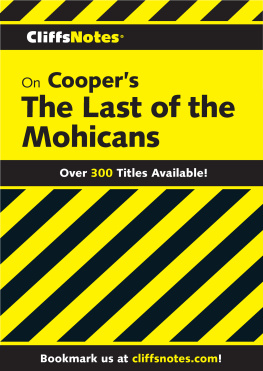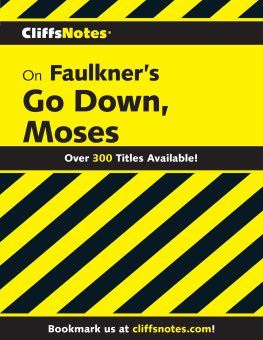V. A. Shahane - CliffsNotes on Whitmans Leaves of Grass
Here you can read online V. A. Shahane - CliffsNotes on Whitmans Leaves of Grass full text of the book (entire story) in english for free. Download pdf and epub, get meaning, cover and reviews about this ebook. year: 1972, publisher: HMH Books, genre: Science. Description of the work, (preface) as well as reviews are available. Best literature library LitArk.com created for fans of good reading and offers a wide selection of genres:
Romance novel
Science fiction
Adventure
Detective
Science
History
Home and family
Prose
Art
Politics
Computer
Non-fiction
Religion
Business
Children
Humor
Choose a favorite category and find really read worthwhile books. Enjoy immersion in the world of imagination, feel the emotions of the characters or learn something new for yourself, make an fascinating discovery.
- Book:CliffsNotes on Whitmans Leaves of Grass
- Author:
- Publisher:HMH Books
- Genre:
- Year:1972
- Rating:5 / 5
- Favourites:Add to favourites
- Your mark:
- 100
- 1
- 2
- 3
- 4
- 5
CliffsNotes on Whitmans Leaves of Grass: summary, description and annotation
We offer to read an annotation, description, summary or preface (depends on what the author of the book "CliffsNotes on Whitmans Leaves of Grass" wrote himself). If you haven't found the necessary information about the book — write in the comments, we will try to find it.
This CliffsNotes guide includes everything youve come to expect from the trusted experts at CliffsNotes, including analysis of the most widely read literary works.
CliffsNotes on Whitmans Leaves of Grass — read online for free the complete book (whole text) full work
Below is the text of the book, divided by pages. System saving the place of the last page read, allows you to conveniently read the book "CliffsNotes on Whitmans Leaves of Grass" online for free, without having to search again every time where you left off. Put a bookmark, and you can go to the page where you finished reading at any time.
Font size:
Interval:
Bookmark:
Copyright 1972 Houghton Mifflin Harcourt Publishing Company
All rights reserved.
www.hmhco.com
cliffsnotes.com
For information about permission to reproduce selections from this book, write to or to Permissions, Houghton Mifflin Harcourt Publishing Company, 3 Park Avenue, 19th Floor, New York, New York 10016.
The publisher and the author make no representations or warranties with respect to the accuracy or completeness of the contents of this work and specifically disclaim all warranties, including without limitation warranties of fitness for a particular purpose. No warranty may be created or extended by sales or promotional materials. The advice and strategies contained herein may not be suitable for every situation. This work is sold with the understanding that the publisher is not engaged in rendering legal, accounting, or other professional services. If professional assistance is required, the services of a competent professional person should be sought. Neither the publisher nor the author shall be liable for damages arising herefrom. The fact that an organization or website is referred to in this work as a citation and/or a potential source of further information does not mean that the author or the publisher endorses the information the organization or website may provide or recommendations it may make. Further, readers should be aware that Internet websites listed in this work may have changed or disappeared between when this work was written and when it is read.
Trademarks: CliffsNotes, the CliffsNotes logo, Cliffs, cliffsnotes.com, and all related trademarks, logos, and trade dress are trademarks or registered trademarks of Houghton Mifflin Harcourt Publishing Company. All other trademarks are the property of their respective owners. Houghton Mifflin Harcourt is not associated with any product or vendor mentioned in this book.
eISBN 978-0-544-18251-6
v1.0517
Walt Whitman is both a major poet and an outstanding personality in the history of American literature. He rose from obscurity to monumental fame, coming to be recognized as a national figure. His achievement is great, although it has been sometimes obscured by unfair, hostile criticismor, conversely, by extravagant praise. He is essentially a poet, though other aspects of his achievementas philosopher, mystic, or critichave also been stressed.
Walt Whitman was born in West Hills, Long Island, New York on May 31, 1819. His father, Walter, was a laborer, carpenter, and house builder. His mother, Louisa, was a devout Quaker. In 1823, the family moved to Brooklyn, where Walt had his schooling (182530). From 1830 to 1836 he held various jobs, some of them on newspapers in Brooklyn and Manhattan. From 1836 to 1841 he was a schoolteacher in Long Island, despite the paucity of his own education. The division of Whitmans early life between town and country later enabled him to depict both environments with equal understanding and sympathy. He also traveled extensively throughout America, and so could appreciate the various regions of the land.
Between 1841 and 1851 Whitman edited various periodicals and newspapers. It was, apparently, during this period that he began to compose the poems which were later published as Leaves of Grass.
In 1862 Walts brother George was wounded in the Civil War. When Whitman traveled to Virginia to visit him, he saw large numbers of the wounded in hospitals. The Civil War was a major event in Whitmans career, stirring both his imagination and his sensibility and making him a dresser of spiritual wounds as well as of physical ones as he worked as a volunteer in hospitals. Lincolns assassination (1865) also moved Whitman deeply, and several poems bear testimony of his intense grief.
In 1865 Whitman was fired from his post in the Department of the Interior in Washington because of the alleged indecency of Leaves of Grass. He was hired by the Attorney Generals office and remained there until 1873 when he suffered a mild paralytic stroke which left him a semi-invalid. In Whitmans last years (188892), he was mostly confined to his room in the house which he had bought in Camden, New Jersey. Two friends, Horace Traubel and Thomas B. Harried, attended him. He died on March 26, 1892. Thus ended the lifelong pilgrimage of the Good Gray Poet (as his contemporary, critic W. D. OConnor, called him), an immortal in American literature.
Whitman grew into almost a legendary figure, due largely to the charm and magnetism of his personality. Contemporary critics described him as a modern Christ. His face was called serene, proud, cheerful, florid, grave; the features, massive and handsome, with firm blue eyes. His head was described as magestic, large, Homeric, and set upon his strong shoulders with the grandeur of ancient sculpture. These descriptions tend to make Whitman appear almost a mythical personage. But he was very much alive.
Whitman was a being of paradoxes. His dual nature, a profound spirituality combined with an equally profound animality, puzzled even his admirers. John A. Symonds, an English writer, was puzzled by undercurrents of emotional and sexual abnormality in the Calamus poems and questioned Whitman on this issue. Whitmans reply (August 19, 1890) is interesting: My life, young manhood, mid-age, times South, etc., have been jolly bodily, and doubtless open to criticism. Though unmarried I have had six childrentwo are deadone living Southern grandchildfine boy, writes to me occasionallycircumstances... have separated me from intimate relations. But no trace of any children of Whitmans has been found, and it is not unlikely that he merely invented them to stave off further questions.
Whitman was truly a representative of his age and reflected its varied crosscurrents. His poetry shows the impact of the romantic idealism which reached its zenith in the years before the Civil War and also shows something of the scientific realism which dominated the literary scene after 1865. Whitman harmonizes this romanticism and realism to achieve a true representation of the spirit of America. The growth of science and technology in his time affected Whitman deeply, and he responded positively to the idea of progress and evolution. American patriotism in the nineteenth century projected the idea of history in relation to cosmic philosophy: it was thought that change and progress form part of Gods design. The historical process of Americas great growth was therefore part of the divine design, and social and scientific developments were outward facets of real spiritual progress. Whitman shared in this idea of mystic evolution. Leaves of Grass symbolizes the fulfillment of American romanticism as well as of the sense of realistic revolt against it.
Whitman visualized the role of a poet as a seer, as a prophetic genius who could perceive and interpret his own times and also see beyond time. The ideal poet, thought Whitman, portrays the true reality of nature and comprehends and expresses his genuine self. He holds a mirror to his self and to nature; he also illuminates the meaning and significance of the universe and mans relation to it. An ideal poet, he believed, is the poet of man first, then of nature, and finally of God; these elements are united by the poets harmonious visionary power. Though the poet is concerned primarily with the world of the spirit, he accepts science and democracy within his artistic fold, since these are the basic realities of the modern world, especially that of nineteenth-century America. Recognition of the values of science and democracy is indirectly an acknowledgement of the reality of modern life. Whitmans ideal poet is a singer of the self; he also understands the relation between self and the larger realities of the social and political world and of the spiritual universe. He intuitively comprehends the great mysteries of lifebirth, death, and resurrectionand plays the part of a priest and a prophet for mankind.
Next pageFont size:
Interval:
Bookmark:
Similar books «CliffsNotes on Whitmans Leaves of Grass»
Look at similar books to CliffsNotes on Whitmans Leaves of Grass. We have selected literature similar in name and meaning in the hope of providing readers with more options to find new, interesting, not yet read works.
Discussion, reviews of the book CliffsNotes on Whitmans Leaves of Grass and just readers' own opinions. Leave your comments, write what you think about the work, its meaning or the main characters. Specify what exactly you liked and what you didn't like, and why you think so.













